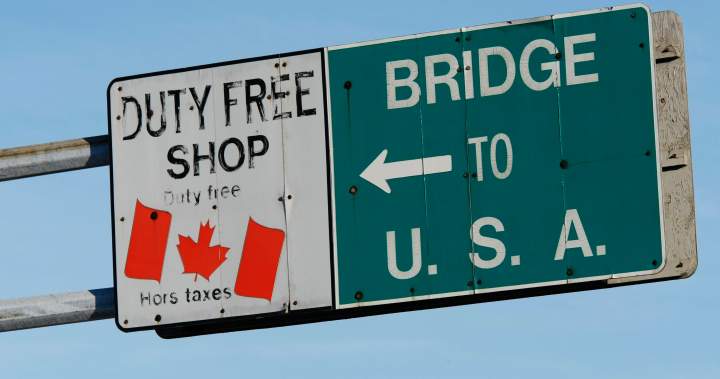U.S. President Donald Trump is ending a key exemption to his tariffs — the de minimis exemptions — and experts say the move could hurt small business owners in Canada.
Under an executive order signed by Trump on Wednesday, packages valued at or under US$800 sent to the U.S. from outside of its postal network will now face “all applicable duties” starting Aug. 29, the White House said.
“The de minimis tariff exemption is a provision in U.S. law whereby shipments of $800 or less are eligible for duty-free treatment as well as exemption from formal entry requirements,” said Christine Abely, an assistant professor at the University of New Hampshire’s Franklin Pierce School of Law.
“Direct sellers who regularly send shipments of $800 or less from outside of United States to U.S. consumers will likely be the most impacted by this change, since they will now have to pay tariffs to the U.S. government on such shipments,” said Abely, who specializes in U.S. international trade law.
The tariff rate on these low-value packages will depend on what Trump has imposed on the product under the International Emergency Economic Powers Act (IEEPA), Abely said.
De minimis exemptions allow low-value Canadian exports to enter the U.S. duty-free, with minimal customs paperwork, said Daniel Snow, managing partner at Ontario-based Traffix Logistics.
These exemptions play a crucial role in facilitating fast and affordable cross-border shipping for Canadian e-commerce merchants, especially small businesses and independent sellers, he said.

Get daily National news
Get the day’s top news, political, economic, and current affairs headlines, delivered to your inbox once a day.
“Niche manufacturers, including producers of artisanal foods, customized apparel, and specialized components like 3D-printed parts, would be especially vulnerable due to their slim profit margins,’ Snow said.
“For example, an artisan selling $50-$200 handmade items on Etsy would suddenly have to navigate duty collection and compliance hurdles that didn’t exist before,” he added.
Paschen said that while the move is chiefly aimed at direct Asian importers like TEMU, Shein, or vendors on platforms like Alibaba, it will also impact First Nations businesses in B.C.
“Any kind of Canadian artisanal or craft business that sells directly to consumers — people sending Cowichan sweaters would be a prime example,” he said.
The impact would be spread across many kinds of small businesses, Snow said.
“Niche food producers selling specialty items like maple syrup or curated snack boxes would see their already tight margins squeezed. Independent bookstores and small publishers sending a single $30 book across the border would find themselves priced out of the U.S. market,” he said.
In addition to adding to the paperwork burden on small business owners, this change “would fundamentally alter the North American e-commerce landscape,” Snow said.
He said this would leave small businesses with few options. Some would be able to absorb the cost or pass it on to American consumers. Others would have to either consolidate shipments with other businesses to save shipping costs or exit the U.S. market altogether.
“This would likely lead many smaller businesses to exit the U.S. market altogether, shifting market share toward larger firms with the resources to absorb these changes,” he said.
— With files from Reuters
Read the full article here

